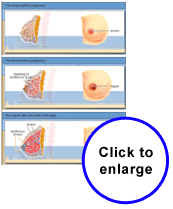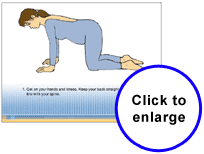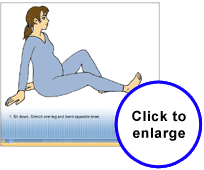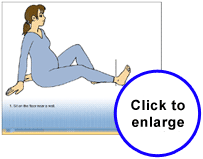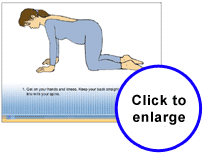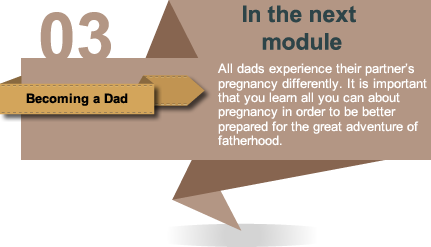Nine Months of Changes
INTRODUCTION
Pregnancy begins when an egg or ovum meets a sperm or spermatozoa and ends with the birth of a baby. Many changes will occur during the nine months of pregnancy.
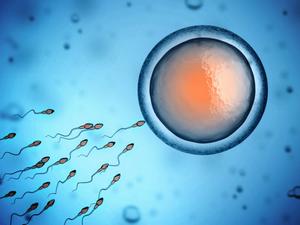
Your body will change as your baby grows. Your uterus will become larger to make room for the baby. Your body will produce more blood to feed the baby and supply oxygen. Your breasts will prepare to produce milk. Emotionally, you are preparing yourself to become a mother and your family to greet a new person.
Each pregnancy is a miracle. During these nine months you are your baby's universe. It is up to you to offer him or her the best world possible.
A. CHANGES DURING PREGNANCY
Pregnancy usually lasts for nine months and one week; that is 40 weeks or 280 days. The first day of pregnancy coincides with the first day of your last menstrual period before becoming pregnant. Pregnancy is generally divided in three sections called trimesters. Each trimester represents a three month period.
In the next pages you will see how your baby grows and how your body changes during pregnancy.
a. The Baby's Growth
The first trimester coincides with the three first months of pregnancy. During the first weeks, the organs are set in place in the embryo by a series of complex proceedings narrowly linked to one another. Even though you do not feel your baby's presence, your baby is alive.
The second trimester coincides with the fourth, fifth, and sixth month of pregnancy. It is a very important period during which the baby, who is not yet ready to survive outside the mother's uterus, reinforces its structure.
The third trimester coincides with the last three months of pregnancy, which are the seventh, eighth, and ninth month. During this period, the baby's organs are being perfected and he or she is growing rapidly. The baby is preparing to come into the world.
The following animation will help you visualize your baby's growth from conception to birth.
b. Physical Changes in the Mother
During the first trimester, the baby grows and develops, but your appearance hardly changes. Several pregnant women will feel general discomfort which is a sign that the baby is already growing.
During the second trimester, most women will feel much better. Fatigue, mood swings, and nausea disappear in most cases. The baby becomes real because you can feel him or her move.
During the third trimester, you are fully aware of the baby's presence. You may experience conflicting feelings. You are excited about seeing your baby but at the same time, you are worried about the delivery.
The following animation will help you visualize the physical changes that occur in the mother during the nine months of pregnancy.
You're almost there! It is normal to have contradictory feelings.You are impatient to see your baby but are apprehensive about what is ahead.
There are a few signs indicating that labour will soon begin:
- Back pain
- Discharge of the mucous plug (the mucous plug with a little blood flows from the vagina).
- Contractions become stronger, more regular and frequent even if you move.
- Rupture of the membranes (the amniotic fluid is expelled in large amounts or as a slow trickle).
- Soft stools.
B. DISCOMFORTS OF PREGNANCY
When you are pregnant, your body changes a great deal. Certain changes may cause normal discomforts. In most cases, you will not need medication or treatment to find relief.
It is also important to note that not all women will feel the discomforts mentioned in this section. In general, if you follow a healthy diet and remain active, you will feel less discomfort during these nine months.
a. Breast Changes
Causes
For most pregnant women, the breasts change from the beginning of the pregnancy until the baby's birth. Your breasts may increase in size. Superficial veins may be prominent and you may feel tingling around the nipples. The dark pigmented area around the nipple (areola) may increase in size and become darker. The little lumps found on the areola may become more apparent.
The following diagram illustrates breast changes during pregnancy.
As pregnancy progresses, you may notice a yellowish, sticky liquid running from your nipples. It is the colostrum that your breasts produce before producing milk. All these changes prepare your body to produce milk so you can feed your baby.
What can I do?
- If your breasts are tender and painful, wearing a maternity bra could help you.
- It is important to wear a good bra when exercising or being active.
- Certain women wear a bra during the night because they feel more comfortable.
- Do not hand express or pump your breasts during pregnancy as this can start labour (the hormone, oxytocin, which contracts the uterus, is released). You can wear nursing pads if your breasts are leaking.
b. Fatigue
Causes
Fatigue is normal during pregnancy. It is more apparent during the first three months. You feel fatigue because your body uses a lot of energy adapting to the pregnancy.
You may also feel fatigue during the last two months because carrying your weight plus the weight of the baby requires a lot of energy.

What can I do?
Here are a few tips to reduce fatigue.
If nothing works?
- Consult your health care provider before taking any medication.
- Avoid coffee or caffeine tablets to stay awake.
c. Frequent Need to Urinate
Causes
The need to urinate increases during the first three months of pregnancy. It is also common during the last weeks before the birth of the baby because the uterus pushes on the bladder which can no longer hold as much urine. You must, therefore, empty your bladder more often.

What can I do?
- It is recommended to drink a lot of liquid during pregnancy. Do not reduce the quantity of liquids you drink during the day.
- If you must get up often during the night to use the bathroom, drink less liquid in the evening.
If nothing works?
- Do not worry. It may bother you, but it is normal.
- If you feel any pain or a burning sensation when you urinate, consult your health care provider. You may have a bladder infection.
d. Nausea and Vomiting
Causes
Morning nausea and morning sickness are expressions used to indicate the urge to vomit (nausea) or the act of vomiting. This condition usually occurs during the first three months of pregnancy but may last longer. Even if we use the term morning sickness, you may experience this at any time during the day or night.
What can I do?
Certain pregnant women experience nausea while others never do. If you are in the first group, you may be unable to avoid nausea, but you may be able to prevent vomiting by trying the following suggestions. You may have to try several tricks before finding the one that is best for you.
If nothing works?
- Talk it over with your health care provider.
- Do not take any medication without consulting your health care provider.
- Don't worry. Although this is very unpleasant for you, morning sickness will not affect the growth or the health of your baby.
e. Headaches
Causes
We all have headaches from time to time. So do pregnant women. During pregnancy, certain women have more headaches than usual because of the changes occurring in their circulatory system. Headaches can also be caused by fatigue or stress.

What can I do?
- Take note of items that cause your headaches and try to avoid them. Eye strain, cigarette smoke, coffee and fluorescent lighting can cause headaches for certain people.
- Rest often.
- Eat several small meals. Do not go for long periods of time without eating.
- Drink lots of liquids.
When you have a headache:
- Rest in a calm area.
- Place a wet compress on your forehead or neck. Some people prefer a hot compress while others prefer a cold compress.
- Rub your neck, shoulders, face, and scalp. It is even better if someone does it for you.
- Get some fresh air.
If nothing works?
- Do not take any painkillers without talking to your health care provider.
- Talk to your health care provider if you often have headaches.
- Consult your health care provider immediately if you have a severe headache, if it lasts for a long time, or if your vision becomes blurred.
f. Vaginal Discharge
Causes
It is normal to have more vaginal discharge when you are pregnant. If this discharge is milky and fluid, there is no need to worry even if it is plentiful.
If the discharge irritates, causes a burning sensation, or has a bad smell, you may have an infection. In this case, consult your health care provider.
What can I do?
- Keep the area clean and dry.
- If the discharge is abundant, wear a pad.
- Do not use a vaginal douche.

g. Dizzy Spells and Fainting
Causes
Pregnant women may feel dizzy and faint because of increased blood circulation. The circulatory system works hard during pregnancy. The uterus exerts pressure on the large blood vessels causing the blood pressure to decrease. Pregnant women with anemia (low iron in the blood) are more prone to dizzy spells and fainting.
What can I do?
Here are a few tips if you are prone to fainting.
h. Back Pain
Causes
Back pain may be the result of poor posture during pregnancy. It may be caused by the stretching of the ligaments that attach the uterus to the belly that is now bigger. Obesity can aggravate back pain.

What can I do?
- Do not gain more than the recommended weight.
- Wear shoes offering good support.
- Stand straight, tighten buttocks and hold your belly in. Good posture will help to relieve the pressure on your back.
- Yoga can help stretch and reinforce the lower back.
- Lift and carry objects with care. Bend your knees and not your back. You will find tips on how to lift in Module 6 entitled "Healthy Activity".
- Sleep on a hard mattress. Turn on your side with your knees bent towards your chest. Your blood circulation will improve if you sleep on your left side. A special therapeutic pillow may also help.
- Use straight back chairs when possible.
- A hot compress, hot water bottle, hot bath, or ice can also alleviate the pain.
- Ask your partner or someone else to massage your back.
- Rotate your pelvis and do abdominal exercises every day. These exercises are found in Module 6 entitled "Healthy Activity". Doing the pelvic tilt exercise is a very efficient way to alleviate back pain. The method is described below.
If nothing works?
- If your back pain persists, and you are worried, consult your health care provider.
- Consult your health care provider before taking any medication.
- Try massage therapy (massage by a certified massage therapist). Certain group insurance plans cover this type of treatment.
i. Varicose Veins
Causes
When you are pregnant, the walls of your blood vessels loosen because of the hormones and stretch in order to transport more blood. In addition, the uterus that is getting larger increases the pressure on the leg veins. Blood circulates more slowly and tends to accumulate in the veins. This may result in varicose veins.

If you have varicose veins, they will get worse during pregnancy. We often say that varicose veins run in the family. These veins are more frequent in overweight women, women carrying twins, or women who stand for long periods. Fatigue can also favour the development of varicose veins.
What can I do?
Here are few tips to help prevent varicose veins during pregnancy.
If you have varicose veins:
- On the legs: Wear support stockings. Put them on before getting up in the morning. If you get up before putting them on and your legs swell, lie back down for ten minutes with your legs elevated before putting your stockings on.
If nothing works?
- Discuss with your health care provider.
- Consult your health care provider before taking any medication.
j. Constipation
Causes
You are constipated if your stools are hard and dry or if you have difficulty having a bowel movement. Constipation is very unpleasant but can be treated naturally.
The intestines (bowels) function less during pregnancy. This may result in constipation. Women taking iron supplements may become constipated. Changes in diet and decreasing exercises can also cause constipation. Later in the pregnancy, the pressure of the uterus against the intestines can aggravate the problem.
What can I do?
Here are a few tips to alleviate constipation.
If nothing works?
- Talk with your health care provider if the problem persists more than a week.
- If your health care provider has prescribed iron supplements, ask if you should stop taking them.
- Never take a laxative or other medication without talking with your health care provider.
k. Gas
Causes
Gas is frequent during pregnancy because your intestines (bowels) have slowed down. Gas has, therefore, more time to form. The pressure of the uterus on the stomach and the intestines also causes gas.
What can I do?
- Think about the foods you ate just before experiencing gas pains. Reduce the foods that cause this problem. Several foods may cause gas. They are different for different people.
- Avoid constipation. Follow the advice given in the section on constipation.
- Remain active
If nothing works?
- Gas is embarrassing but in most cases, not a major problem.
- If gas becomes painful, talk with your health care provider.
l. Swelling
Causes
During pregnancy, your body contains more blood and other fluids. This increase is normal but may cause your feet, hands, and face to swell. This occurs generally during the last three months of pregnancy. Approximately eight out of ten women have problems with swelling during pregnancy.
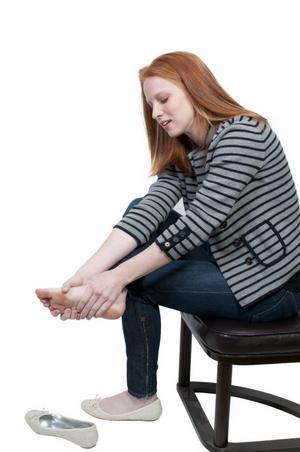
What can I do?
- Avoid tight clothing and accessories such as elastic belts, ankle or knee stockings with wide elastic bands, rings, and watch bracelets that are too tight.
- Try to put on weight gradually.
- Avoid standing for long periods.
- Avoid crossing your legs.
- If your hands are swollen, bend and straighten your fingers and make circles with your hands.
- Rest with your feet elevated as often as possible. Lie down on your left side. This may increase blood circulation and decrease swelling.
- Try to reduce your physical work.
If your ankles and feet are swollen, repeat the following exercise for 10 to 15 minutes twice a day.
If nothing works?
- Consult your health care provider before taking any type of medication.
- If you feel tingling in your hands especially during the night, talk with your health care provider or physiotherapist.
- Consult your health care provider immediately if your hands or face swell suddenly or if they become numb.
m. Stretch Marks
Causes
Reddish or mauvish marks can appear on the breasts, belly, thighs, or buttocks. These marks are caused by the stretching of the elastic skin tissues and by the changes in hormones. These changes may also cause itchiness. With time the red marks will change color and become more silver. Not all women get stretch marks.
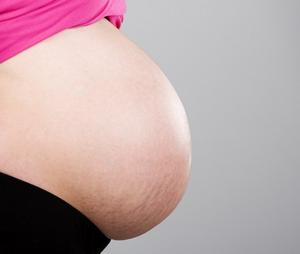
What can I do?
- If you are itchy, rub your skin with an oil or unscented lotion.
- Specialty creams and lotions will not make these marks disappear.
n. Cramps in the Feet and Calves
Causes
Cramps in the feet and calves are more frequent during the last three months of pregnancy. They can be caused by the pressure of the uterus on the blood vessels that descend into the legs. Pointing your toes while stretching can cause cramps.
What can I do?
- Remain active. Exercise stimulates blood circulation in the legs.
- Be careful not to point your toes while stretching especially when you get up in the morning.
- Wear comfortable shoes.
- Avoid standing for long periods.
- Wrap ice in a damp towel and place it on the painful muscles. Leave it for 10 to 12 minutes to relax the muscles.
- If you have a cramp, do not rub or tighten the muscle. The blood vessels are delicate and applying pressure may aggravate the cramp. It is better to stretch gently.
To alleviate cramps in the feet.
To alleviate cramps in the calf
If nothing works?
- Talk with your health care provider if you often have painful cramps.
o. Heartburn
Causes
Heartburn occurs when the stomach acids flow back into the lower end of the esophagus (reflux). During pregnancy, there are two causes: hormones relax the muscles of the upper opening of the stomach allowing acids to reflux; and your uterus, which is growing, pushes against the stomach causing acids to flow back into the esophagus.
What can I do?
Advice to avoid heartburn.
If you have heartburn:
- Take small mouthfuls of water or milk.
- Sit or stand straight. The horizontal positions aggravate the condition.
- At night, raise the head of your bed or use additional pillows.
- Try sleeping on your side.
If nothing works?
- Talk with your health care provider or pharmacist before taking any antacids or other type of medication.
p. Hemorrhoids
Causes
Hemorrhoids are swollen veins in the rectum. They are caused by the pressure of the baby on the lower part of your belly. They can also be caused by pushing too much when you are having a bowel movement. Hemorrhoids can be painful and annoying and can eventually come out of the rectum. They usually disappear after delivery but in some cases remain for a few more weeks after the birth.
What can I do?
Advice to avoid or alleviate hemorrhoids.
If nothing works?
- Talk with your health care provider.
- Do not use any medication, ointment, or suppository, before talking with your health care provider.
q. Groin Pain
Causes
Near the end of your pregnancy, you may feel an unpleasant gnawing or stretching sensation in your groin or lower abdomen. This sensation is caused by the weight of the uterus which is stretching the ligaments that hold it in place. You may feel this pain when exercising, coughing or sneezing. It is unpleasant but not serious. Remain active even if you feel this pain.
What can I do?
- Stand straight. A poor posture can cause or aggravate this pain.
- Do not stand for long periods.
- If this pain occurs while exercising try to see what is causing the pain and avoid this movement.
If you have pain in the groin:
- Rub the painful spot lightly using circular motions. Use slight pressure with downward movements.
- To stop a sudden pain, lean against an object for support and use your two hands to raise your belly. This will relieve the pressure. Keep this position until the pain disappears.
- Lie on your painful side and bend your knees towards your belly. This position reduces the pressure on the ligaments and can give quick relief.
- Try the pelvic tilt exercise on your hands and knees.
If nothing works?
- Talk with your health care provider if this situation is painful and occurs frequently.
r. Shortness of Breath
Causes
You may feel out of breath during your entire pregnancy. As your uterus gets bigger, it pushes against your ribs, reducing the space in which your lungs can expand. In most cases the shortness of breath disappears when the baby gets bigger and moves down into the pelvis. For most women expecting their first child, this happens about two weeks before the onset of labour.

What can I do?
- There is not much to do to prevent this discomfort. A good posture may help. Having a straight posture will increase the space for your lungs to expand.
- Sleep with several pillows under your head and shoulders.
- Take slow, deep breaths.
- Raise your arms over your head to lift your ribcage.
- Do not get overtired.
- Wear roomy clothes.
If nothing works?
- Talk with your health care provider. Shortness of breath may indicate a lack of iron in your blood.
s. Insomnia
Causes
Certain women have difficulty falling asleep or staying asleep during pregnancy. During the first three months, it is often because the body is adapting to the changes common during pregnancy. Later, during the pregnancy because of the size of your uterus and the baby's movements, you may have difficulty finding a comfortable position to sleep. Insomnia may be more severe for women who experience shortness of breath.

What can I do?
Advice to help you sleep.
If nothing works?
- Do not take any medication to help you sleep before talking with your health care provider.
t. Allergies and Sinus Congestion
Causes
Certain pregnant women notice they are congested or suffer from allergies even though they did not have this condition prior to the pregnancy. It is caused by increased blood flow to the nasal area which causes swelling, dryness, and occasional bleeding.

What can I do?
- Apply petroleum jelly (ex: VaselineTM) to the nasal area to alleviate the dryness and prevent bleeding.
- Place a hot damp towel on your face.
- Breathe the vapours from a vapourizer or from a hot shower.
- Avoid smoke.
- Drink liquids like milk, water, and juice.
- Try saline solution drops in your nose.
- Do not use antihistamines (medication against allergies) without talking to your health care provider.
- Tell your health care provider if your nose bleeds frequently.
- Massage your sinus as follows.
u. Changes in Vision
Causes
The lens of the eye can swell because of the increase in body fluids during pregnancy. This may have a short-term effect on your vision. The cornea on the outside of the eye can also swell causing problems with contact lenses. You do not have to purchase new eyeglasses or contact lenses because this effect usually disappears after delivery.

CONCLUSION
Pregnancy is a time of change and it is normal to have questions.
Each pregnancy is different. Many mothers worry about the discomfort they feel. Others worry about the lack of discomfort. If you have questions about what is happening, talk to your health care provider or a public health nurse.
Watching your body change as your baby develops can be very exciting. Eating healthy and remaining active will help prevent or alleviate most discomfort. You will be able to fully enjoy your pregnancy.



